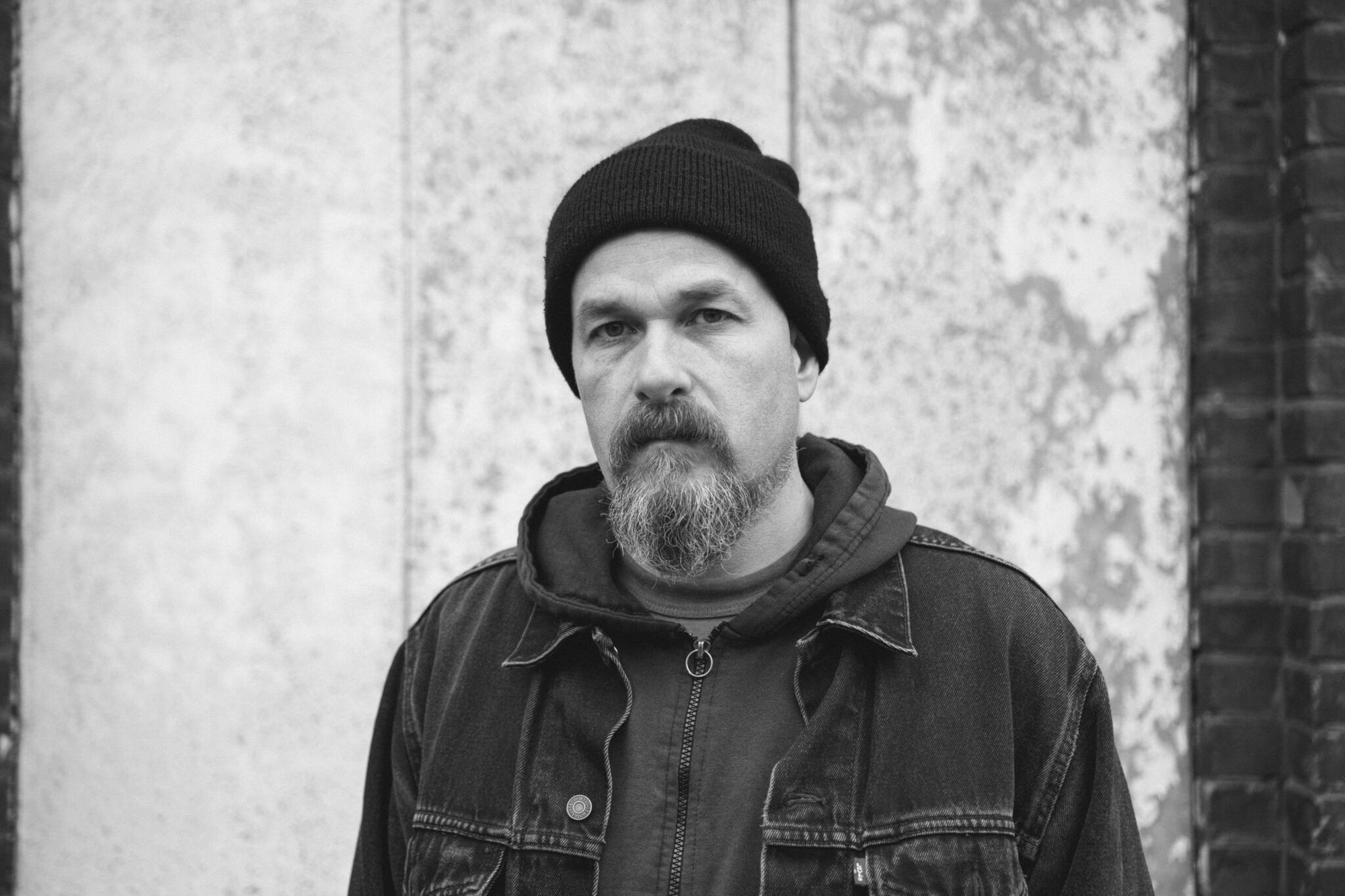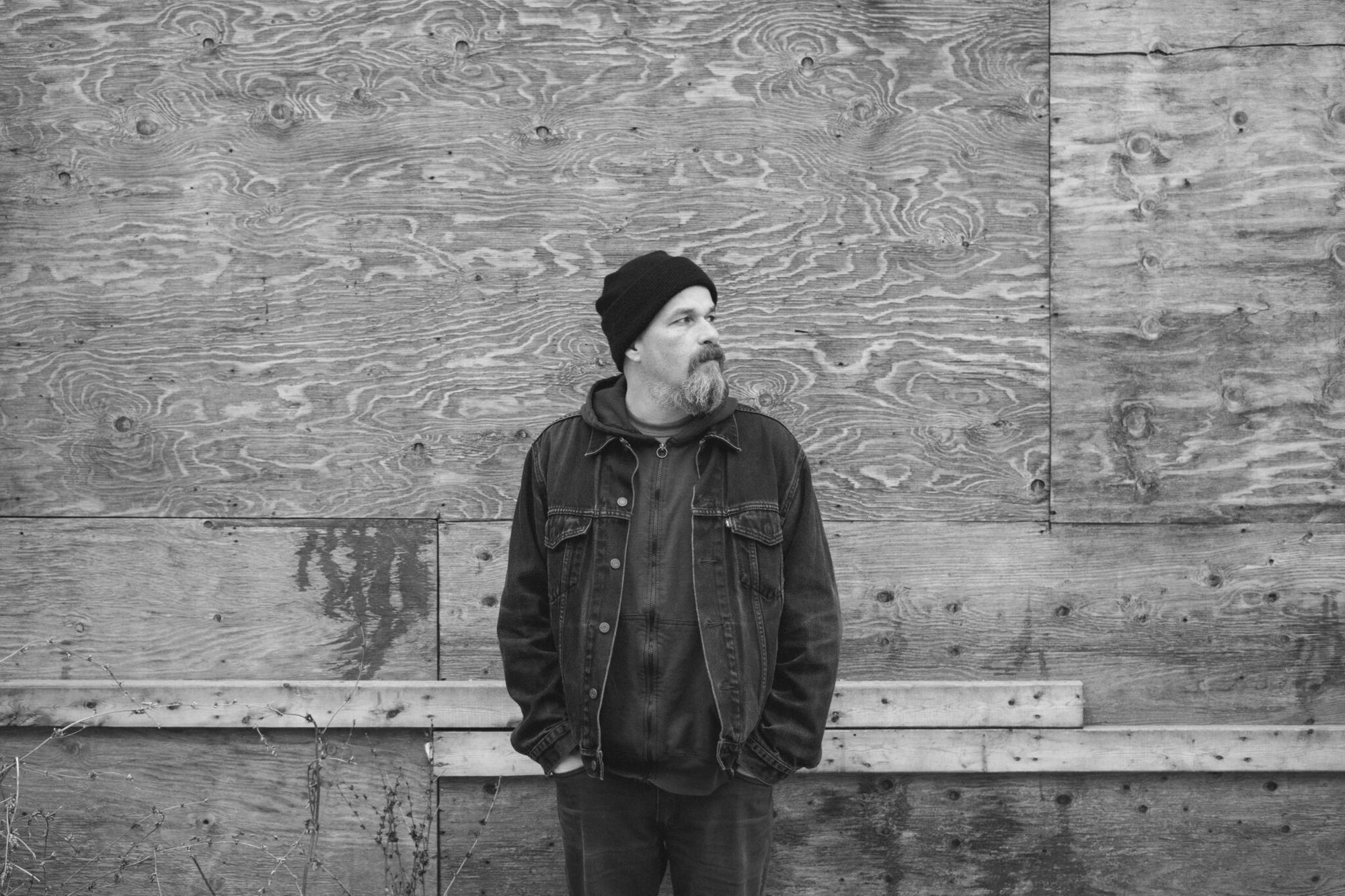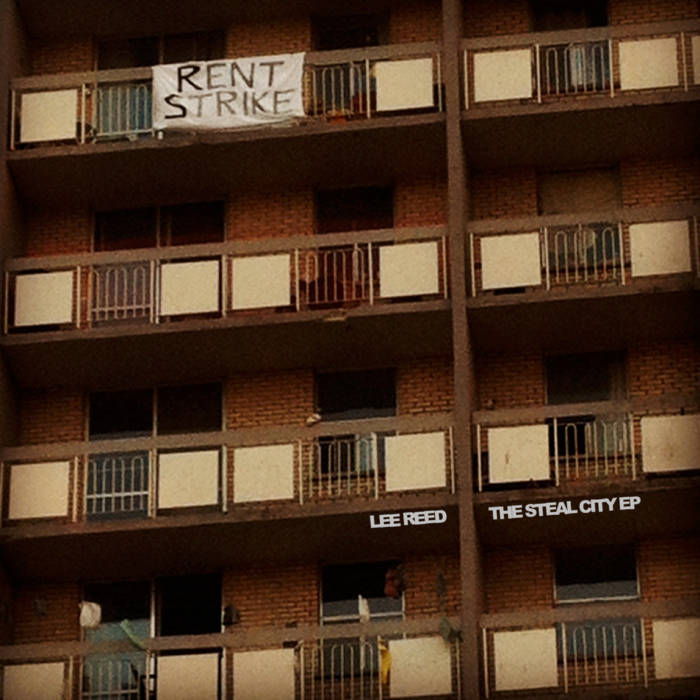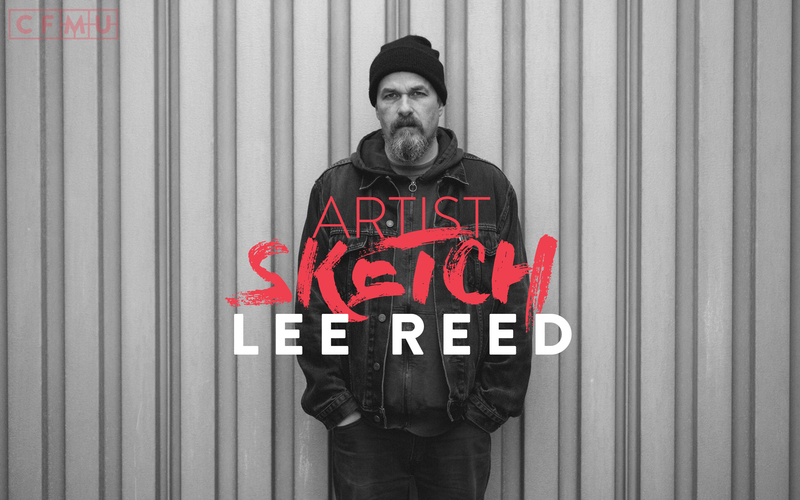Stop being civil and get mad: Rapper and Activist Lee Reed - CFMU Artist Sketch
"The foremen and management team were all white Europeans or North Americans living in fancy houses, while these Thais worked their asses off for chump change."
Today’s world is a troubling one: Global conflict dominates the front pages, inequities are woven into the fabric of our society, and political turmoil rages on in several countries. It is no wonder many feel powerless in the face of it all. How far can we pull ourselves up by our bootstraps before we realize the impossibility of such a task?
As injustices grow and climate change reaches a point of no return, Lee Reed says it’s time to stop being civil and get mad.
Well-known in the Hamilton music scene for over 20 years, Reed offers his listeners an alternative to the grind and draining system we pull ourselves through every day: Capitalism is the problem, and the solution is the people.
His latest album, Before & Aftermath, explores the dystopian present and potential future out planet faces, from the corruption of law enforcement to the necessity of direct action by the people. Reed’s music is blunt and passionate, the perfect mix to ignite a fire in listeners’ hearts. It’s no surprise The Steal City EP was CFMU’s number one chart topper of 2018.
We got a chance to interview Reed following his latest album’s release.
You describe yourself as an anti-capitalist. What led you to adopt those beliefs?
R: Well, there’s been different levels to that. I’d say it started when I was a kid. I’d always had a hate-on for authority and authority figures. Well before I could articulate or understand it, I was developing a distaste for elitism, classism and, ultimately, capitalism.

I grew up in a small tourist town up north. I got my first job at 13, scooping ice cream for cottagers and camp kids. I learned at a pretty young age that most people are born into hard work and hustle, but some people are born into wealth, leisure, and summers off.
As I got older, working part-time through my teens and University years, I learned that these kids, the ones not working all those years, were the ones getting the high-paying jobs in College and University. I came to realize, at a pretty young age, that our economy was rigged, and when it came to opportunity and success - hard work and smarts could never compete with wealth and high socio-economic status.
In my 20’s, I lived overseas for a few years, one of the places being northern Thailand. There I came to see how western imperialism played out on the world stage. The farms growing our food were sprayed with DDT and chemicals that had long been banned back home. We ate the products. We owned the farms and canning factories. But the Thai workers suffered the effects of the chemicals.
"and just like back home, it was rigged to favour the rich at the expense of the poor."
The shoe and clothing factories had buses full of young young women (maybe girls?) twice a day, with thousands of workers filing in and out of these massive factories/warehouses. The foremen and management team were all white Europeans or North Americans living in fancy houses, while these Thais worked their asses off for chump change. It became really clear to me that the western model of economics was spreading across the globe, and just like back home, it was rigged to favour the rich at the expense of the poor.
RELATED: McMaster student Shaili Champ offers unflinching and honest lyricism on a bed of catchy and upbeat melodies, creating a space of both empowerment and self-celebration. Read our interview with her here.
In the years that followed, I got into activism, organizing and what many would call ‘radical’ politics. And the more I learned, the more clear it became to me: capitalism is killing us; capitalism is killing the planet. You start to add in the more recent science on climate change; the unending wars in the middle east; the water and food scarcity; the species and habitat loss; the run on petrol. etc. It just became more and more clear to me: we need a drastic and complete reorganization of our social, political and economic order…or we’re doomed.
How did your activism take the form of rap music?
R: Throughout all the “political growth”, my soundtrack and musical taste was always protest/political music, even from a really young age, and that started with Hip-hop. I became a teen in the mid 80’s as Hip-hop started spreading from New York to the rest of the world. For whatever reason (probably just lucky timing with my age, and the way music interacts with youth culture), it really spoke to me and moved me. There was nothing like it.
I loved every rap song I came across, and when you think about how it came to be, how it was born, Hip-hop’s very existence was revolutionary: A style of music that was born from an inner-city grass-roots movement/culture. Untamed/untainted by commercial interests. It was a powerful form of music that stood in opposition to old ways and old thinking, and I loved those revolutionary aspects of it.
In the early days, Hip-hop was very much rooted in social commentary and class analysis. Even when the artist wasn’t explicitly “political rap” in the way we think about it today, the material was all rooted in commentary on oppression, cops, the legal system, poverty, etc. Shining some light on the dark underbelly of America. And, whether I knew it or not, hip-hop was definitely informing my politics and understanding of history and western culture.
"My first live rap performance was at a club in Seoul, Korea."
Then came some of the more expressly political rap. Groups like Public Enemy, Boogie Down Productions, KRS-ONE, etc. Here were Artists creating “protest music” like the folk artists from the 60s, and this really drew me in. Public Enemy’s first album “Yo! Bum Rush the Show” was a defining album for me. I listened to that thing, front to end, thousands of times when I got it. I could almost recite every word from the record after a few months. That style of protest/radical music just always spoke to me and I constantly sought it out.
"Whether I knew it or not, hip-hop was definitely informing my politics and understanding of history and western culture."
So, although I was a big rap fan, I would look to other genres for that type of ‘music with a message’. Punk groups like Dead Kennedys, Circle Jerks, Minor Threat, Fugazi, etc. come to mind. I even got into Pete Seeger, Woody and Arlo Guthrie, Bob Dylan, and other old folk stuff. In later years it was Rage Against the Machine, Propagandhi, etc. I was always looking for more of that feel that early Hip-hop gave me, whatever the style. That follows me to this day. Still always on the lookout for good radical/revolutionary music.
I didn’t start writing rap myself until my later 20’s, when I was living overseas. I met quite a few Americans that were into making Hip-hop… and although they were nice folks, their raps sucked. I knew I could do better. So, I started writing it, almost in secret.
My first live rap performance was at a club in Seoul, Korea. Some pals from the States had a ‘hip-hop’ night at this underground club we went to, and they would rap between songs sometimes. They invited me to try it. And I killed it! The owner, staff and DJ’s loved it, and I ended up doing almost every weekend for the rest of my time there. They would give me free entry, free beer and big hugs and high-fives for doing one or two songs. I became hooked.

My music was, right from the jump, an attempt at ‘political’ or ‘protest’ music. All that said, I’ve never really felt comfortable talking about my music AS activism. I mean, I consider myself an activist, and I consider myself a rapper, but I’m not sure I can really say my music, in and of itself, IS activism. In some ways, I could make the case for it. Some of my songs are so topical that they can read like a political pamphlet or zine. Songs like “Stop Line 9” that were written about a specific political campaign, my “Steal City EP” which was all about gentrification, or songs like ACAB, addressing issues around policing, with popular political slogans. I guess I could say these songs are a form of activism.
But really, to me, activism, or good activism, at least, needs to go deeper than just ‘awareness building’ or making songs about issues. I mean, that’s one part of it. But, to me, a good artist-activist does real organizing too. They work with organizations and activists, and support struggles in real and material ways: raising money; staging shows at occupations and protests; using their platforms to spread info on campaigns, actions and protests; giving their music, time and creativity, freely, to help support activists/groups; using their music and persona to connect the work of activists with folks that otherwise wouldn’t know about the issue, etc. Materially supporting frontline struggles. And that’s something that I work hard to do.
“To me, activism, or good activism, at least, needs to go deeper than just ‘awareness building’ or making songs about issues…a good artist-activist does real organizing too.”

Your most recent album, Before & Aftermath, explores anti-capitalist thought with rally cries such as “Get Mad” and the rejection of authoritarianism and the police system in “ACAB”.
R: Before & Aftermath continues down that political/protest music path. I guess the big difference with this record was knowing, going in, that it was being picked up by an American label. So, it’s quite a bit less ‘Canadian’ than my last couple releases. Less specifically Canadian references, etc. Compared to my last full-length (The Butcher, The Banker, The Bitumen Tanker), the topics/themes are a lot more universal or global? It has stuff that an American and European audience would better feel and relate to. In many ways, though, it’s the same as the rest of my catalogue: angry, anarchist rap.
In the overflow of negative news and tragedies, how do you stay motivated in your goals?
R: Yeah, the world is a bloody mess, eh? Living, as we are, in the midst of the 6th mass extinction - it can get pretty hard to keep motivated and avoid feeling powerless and defeated. For me, the antidote to that feeling is action and organizing. Building people power. Connecting with like-minded folks and fighting back. In the past couple years, for instance, I’ve done a lot of work in support of Indigenous resistance. Materially with fundraising, performances at actions/protests, ‘showing up’ for marches, demos and other actions, using my platforms to spread info and connect activist struggles. And then, through my writing, which reflected a lot on Indigenous issues in “The Butcher, The Banker, The Bitumen Tanker”.
This past year was a really busy year for me with organizing work. I’m a member of the Hamilton Tenants Solidarity Network, which worked in support of the East Hamilton Rent Strike and the Stoney Creek Towers Tenants Committee this year. We’ve spent the last 9-10 months on the frontline there -door-knocking, doing calls, holding and/or attending meetings, and planning and running actions.
NB: Proceeds from Lee Reed's 'Steal City' EP go to the Hamilton Tenants Solidarity Network and is exclusively avalible for purchase on his bandcamp.

Then we were fundraising all summer and fall for the Rent Strike fund. I brought my musical and political worlds together in July, with the “Steal City EP”, which was inspired by the housing struggles I’d been working on, and the badass working class rent strikers we’d been working with. The EP was released digitally, with all proceeds going to the Rent Strike Defence Fund. Did a couple release shows around it, raising a couple thousand dollars at the door. And managed to sell $1800 worth of EP’s “by donation” so far. I’m really proud of that work, and it’s that feeling that keeps me motivated, and able to face al the drudgery and bullshit.
What is one message you’d like the people of McMaster to know?
R: Young people everywhere should know that any world is possible. That all the naysayers, detractors and folks guarding the status quo are lying to you. You can change the world. You don’t have to accept what this economy/system of politics is forcing on you. There are other ways to organize our societies. There is hope, and that hope resides in our willingness to connect with our communities and fight back.
With enough organization and boots on the ground, we can create any future we want. We don’t have to resign ourselves to the alienation and defeat that capitalism is force-feeding us. We can create new ways of living and being that don’t systemically kill the planet. We can find new ways to organize our communities, to put life and well-being ahead of profit.
Any world is possible. We just need to get up and fight for it.
Before & Aftermath is available on Bandcamp, Spotify, and Strange Famous Records.
Hayley Mullen is a 4th year Communications student and the Production Coordinator at CFMU. She hosts Study Jams every Thursday on CMFU, and has been a devoted musician/composer for over eight years.
WATCH: “Black art and expression is attacked from all sides anyway,” he summarizes, saying that hip-hop media should “build and not destroy.” - Chuck D, Public Enemy. CFMU’s Claire Hynes had a chance to talk to Chuck D after the release of 1994’s Muse Sick-n-Hour Mess Age, their fifth album.
